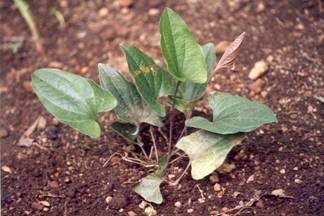|
Jeevani' The elixir of Kani tribes : Arogyapacha (Trichopus zeylanicus)
Scientific classification
Kingdom: Plantae
Division: Magnoliophyta
Class: Liliopsida
Order: Dioscoreales
Family: Dioscoreaceae
Genus: Trichopus
Species: Trichopus zeylanicus
Trichopus zeylanicus is a plant found in the Agastyar Koodam ranges in Kerala, India. Belonging to the family Trichopodaceae, it is a herbaceous, perennial, rhoizomatous plant found in the Agastyar Hills of Western Ghats, one of the "Hot Spots" of the Country (Kerala and Tamil Nadu region), Srilanka, and Malasia. In Srilanka it grows in low land sandy forest near streams. In the Malaya peninsula it is found in lowlying forest. In India it is found at an altitude of around 1,000 meters. The sub species found in India is called Trychopus zeylanicus travancoricus .
The malayalam name of the plant is "Arogya pacha" - literally meaning "the green that gives strength". It was an accidental discovery made a team lead by Scientists of TBGRI during the Ethnomedico-Botanical exploration to the Agastyar valley areas of Thiruvananthapuram District, Kerala, India, which is located in the southern most part of the Western Ghats that the plant, Trychopus sp., abundant in that area, has restorative and anti-fatigue properties. The discovery of the unique property of the plant was based on the leads obtained from disclosures by the Kani tribe people who accompanied the group as Porters and Guides.
The Kanis mainly inhabit the forests of Thiruvananthapuram Districts of Kerala. Kanis are traditionally a nomadic community, but most of them are settled now for long time. The unripe fruits of 'Arogyapacha' are eaten fresh to remain healthy and agile by Kanis during their long trekking trips in the forest for procuring their livelihood requirements.
Detailed chemical and phamacological investigations showed that the leaf of the plant contained various glycolipids and some other non-steroidal compounds with profound adaptogenic and immmuno-enhancing properties. The fruits showed mainly anti-fatigue properties. The Tropical Botanical Gardens Research Institute (TBGRI) was successful in developing a scientifically validated and standardized herbal drug, based on the tribal knowledge. The drug was named as Jeevani and was released for commercial production in 1995 by Arya Vaidya Pharmacy. While transferring the technology for production of the drug to the pharmaceutical firm, TBGRI agreed to share the license fee and royalty with the tribal community on a fifty-fifty basis.
|